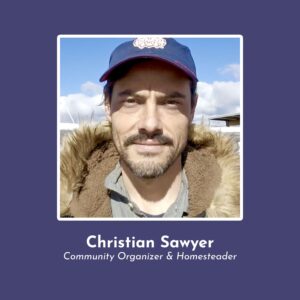
Ep 156 | Christian Sawyer
Christian Sawyer: “The Great Simplification in Action: Building Resilience Through Local Communities”
Show Summary
Long-time listeners of The Great Simplification may have a good grasp of the many impending crises that humanity faces. But once we understand the scope of this predicament, what changes could we make to prepare in our own communities right now?
Today, Nate is joined by local organizer and activist Christian Sawyer, to discuss how he’s built a pro-social community in rural Arizona. Christian emphasizes the power of local collaboration and demonstrates how the cultivation of social capital builds resilience in the face of challenges, as well as creates better lives for those who live in the community. Together, Nate and Christian explore the dynamics of community work parties, the skills learned through cooperation, and the significance of trust and friendship in building a supportive network.
What do aspects of The Great Simplification look like in action? What are the most common challenges faced in group settings, and what lessons can it teach about the values of love, wisdom, and art in fostering meaningful connections? How can anyone, anywhere start creating local initiatives and engaging with ecological awareness? When fostering community, why should we emphasize empowering individuals in order to solve local problems and advocate towards the protection of our most important resources?
About Christian Sawyer
Christian Sawyer is a local organizer, community lobbyist, sustainable home builder, musician, researcher, and groundwater activist in rural southeast Arizona. He is a journalist for the Arizona Agenda, as well as for Ground Party Papers, a local newsletter for alternative, off-grid, sustainable lifestyles.
In French, we have a motto that says that a simple drawing is often better than a long explanation. Jean-Marc Jancovici Carbone 4 President
That’s very understandable because with left atmosphere thinking, one of the problems is that you see everything as a series of problems that must have solutions. Iain McGilchrist Neuroscientist and Philosopher
We can’t have hundreds and hundreds of real relationships that are healthy because that requires time and effort and full attention and awareness of being in real relationship and conversation with the other human. Nate Hagens Director of ISEOF
This is the crux of the whole problem. Individual parts of nature are more valuable than the biocomplexity of nature. Thomas Crowther Founder Restor
Show Notes & Links to Learn More
Download transcript00:00 – Christian Sawyer newsletter + Slack group + Substack
03:59 – Conservation Corps
05:01 – Techno-economic assessment
05:11 – Solar river prototype in Bisbee
12:03 – Bioregion + bioregionalism
18:26 – Geodesic domes + hyperadobe homes + straw-bale construction
18:36 – Superadobe
36:52 – Cochise County opt-out permits + more info
42:59 – Schelling point
47:35 – Qigong






